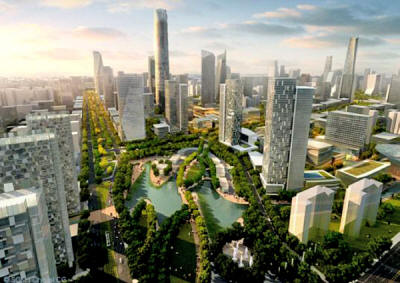
by Susanne Posel
July 17, 2012
from
OccupyCorporatism Website

At the 2012 UN Earth Summit for Sustainable
Development Rio+20 there was
an initiative to offer,
“many great opportunities for people from
all over the world to come together, build bridges, and draft a common
path upon which all residents of this breathtakingly beautiful planet we
call home can journey towards a sustainable and equitable future.”
This ideal would be brought to life in the plans
of Agenda 21 Ecocities.
The blueprint for “a prosperous, secure and sustainable future for people
and planet” where Agenda 21 comes to life under the directives of the UN and
with the cooperation of the world’s governments, non-governmental
organizations (NGOs) and private-sector corporations.
The
Ecocity Builders is a non-profit organization which is a collaboration
of international networks of associates that influence and actively
participate in local city planning projects all across the US. Through
training courses, they advocate the ecocity approach as the only way to
continue in civilized society.
Through coercive conferences like the
International Ecocity Conference
series that is an international movement toward building locally and
globally.
They have created UN sustainable cities in countries like,
-
India
-
Nepal
-
Bangladesh
-
Brazil
-
Senegal
-
South Africa
-
Turkey
-
nine countries in
Europe
-
Korea
-
Australia
They focus on reworking current issues to match
UN Agenda 21 guidelines in
planning for local cities including transportation, energy, architecture,
design, natural restoration, development, planning, and advocacy.
The push toward the ecocity is the design of a metropolitan city that puts
nature first and humanity last. Their justification for moving people into
ecocities and out of the rural areas is that 90% of people currently live in
or near a major city – why not just move everyone in closer together.
They characterize the ecocity as:
-
Human settlements modeled after
sustainable development that functions with natural ecosystems and
living organisms
-
Reduce the inhabitants ecological impact
on the environment
-
Restoration of ecosystems after the
recolonization of humans into dense cities
-
Sustainable living under Agenda 21
supports regional, national and global economic systems
Urban ecocities claim can regulate climate
change, food distribution, nutrient balance, and water securitization that
provide the general masses with provisions, culture and support in ways that
are not facilitated by the current living conditions.
These ecocities can control the inhabitants movements by mandating mass
transit and removing the ability to use personal cars, be build and designed
in ways that support surrounding environments and natural resources, and
mitigate the human impact on climate change as man-made influence is the
direct causation of the destruction of the biosphere.
Ultimately, ecocities are sold as “a practical vision for a sustainable and
restorative human presence on this planet and suggests a path towards its
achievement through the rebuilding of cities, towns and villages in balance
with living systems.”
In Surat, India The Ecological Sequestration Trust (TEST) is funding
the building of an ecocity that adheres to Agenda 21 sustainable development
models.
Beginning this month, TEST and the
South Gujarat Chamber of Commerce is
funneling funds to construct green buildings that reduce heat and regulate
water use, pair with an intelligent mass transit system, control traffic and
use GPS to map routes for tenants to take on local roads. Reduced use of
existing roadways will be facilitated by an eco-friendly transit system.
Peter Head, director of TEST remarked:
“Surat can be the next Singapore in terms of
ecology and water management systems.”
Ecologically sustainable “megacities” will
direct three sectors to ensure control over resources – water, energy and
food security. Integrating land use plans will provide that by 2013 these
schemes will be well underway.
In the plans is a directive to force 75% of the Surat population to use mass
transit or “para transit like rickshaws and other modes of travel.” Commuter
travel will be strongly suggested to reduce CO2 emissions.
SK Datta, senior planner for The Surat Urban Development Authority (SUDA)
said:
“The integration of sanitation, sewerage and
other amenities along with land use in the master plan 2013 will change
the face of Surat city dramatically.”
Control over life in the ecocity will include:
-
Reduction of urban city temperature by 3
to 4 degrees
-
Regulated community food production
spaces
-
Mandated reduction of travel time with
intelligent transit systems
-
Controlled use of energy, water and
waste
-
Mandated green top technology buildings
-
Forced reduction of public water use
Ecocities are the global Elite’s answer to dense
and controlled urban landscapes where human life is severely restricted.
These ecocities are not in some far off and distant future. They are being
constructed NOW.
And soon, they will be the only available place
to live.

